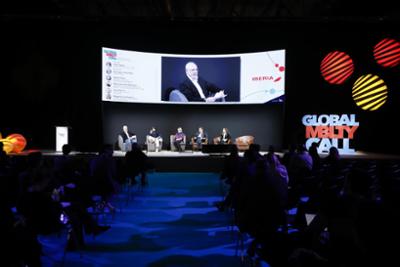

Global Mobility Call 2024 consolidates its position with 8,000 physical visitors and a 20% increase in online visitors

From 19 to 21 November, more than 8,000 people gathered at IFEMA MADRID at the largest public-private debate and collaboration space in the field of sustainable mobility.
Global Mobility Call concluded its third edition this Thursday, with a call to action for governments, companies and agents involved in the design of mobility to redouble their efforts and collaboration for a more sustainable future that benefits the whole society.
From 19 to 21 November, more than 10,000 professionals (8,000 in person and 2,000 online) gathered for the largest event dealing with sustainable mobility organised by IFEMA MADRID and Smobhub in a Congress & Expo format that brought together some 450 opinion leaders and influential national and international experts in a total of 115 round tables and keynote speeches. The sessions dove into the latest trends, projects and solutions to strengthen and accelerate the transformation that companies and institutions are undertaking. GMC promoted the creation of alliances and collaboration between the multiple actors of the sector.
Arancha Priede, IFEMA MADRID's General Manager of Trade Fair and Congress Business, closed this edition of GMC, expressing her confidence that this event ‘has gone beyond the exhibition of alternatives, and has facilitated the achievement of progress and the implementation of solutions, and that it consolidates links to advance in investment, research and the implementation of major projects, as well as consolidating spaces for collaboration and alliances between the public and private sectors’. She also announced that in the coming months, the Second Report on Sustainable Mobility Global Mobility Call 2024 will be published in collaboration with the Fraunhofer Institute and Bable. The report will include all the ideas and proposals from this edition.
At this event, Smobhub co-founder Juncal Garrido said that GMC has always aimed to be a vehicle for global transformation and that the experience created should continue to drive international collaboration: "Global Mobility Call is not just an event; it is a call to action for governments, companies and communities to work together towards a more sustainable future. Let's ensure that the ideas and partnerships that have emerged here translate into tangible results that benefit society at large".
At the closing ceremony, the Global Mobility Call awards were presented. The first of these, the Top Innovator award went to Celering, for its innovative solutions that promote inclusive mobility, ensuring that no one is left behind on the road to a more connected and accessible future. The next award, for Best Designed Stand, went to Grupo Ruiz, recognising the aesthetics and functionality, as well as the ability of its stand design to communicate the values of sustainability, innovation and commitment to the future of mobility. Finally, the award for the Most Sustainable Stand went to Ciclosfera.
In this edition, Global Mobility Call has established itself as one of the epicentres for defining the keys to the future of sustainable mobility worldwide, in a space that promotes debate on this transformation process and the promotion of public-private collaboration in projects, investments and cutting-edge solutions.
The congress agenda this year has been developed following seven itineraries to shape themes framed within the global debate on sustainable mobility: Energy transition: Driving the transformation of mobility; Urban mobility: Public transport solutions and shared mobility; Intermodal transport: Efficient and sustainable mobility; Smart mobility planning: Designing more liveable urban spaces; Automotive transformation: Adapting to a new era of mobility; Technology trends: Accelerating the mobility revolution; and Strategic Disruption: Innovation, Talent and Cybersecurity.
Renowned experts and sector leaders participated in this edition. Among them John McMonigle, Secretary General of the International Energy Federation; Ivan Marten, President of the Basque Institute of Competitiveness (Orkestra); Louis Zacharilla, founder of the Intelligent Community Group; Chris Barton, founder and creator of Shazam; international mobility experts Roger Atkins, Sampo Hietanen and Maya Bon Dror or Oleg Polovynko, advisor to the Mayor of Kyiv on digitisation. Also Valentina Galasso, chair of the PIARC International Committee on Network Operation and ITS, partner at Deloitte, Italy; Stefan Di Bitonto, Deputy Director Mechanical & Electronic Technologies Germany Trade & Invest (GTAI), among others.
In this agenda, municipal governments have played an important role in the presentation of experiences and projects, so municipal representatives from Stuttgart, Copenhagen, Brussels, Bologna, Milan, Krakow, Stockholm, Oslo, Bordeaux, Budapest, Chicago, Boston, Cincinnati, Aurora, Portland, Istanbul, Guimaraes, Barcelos, Crete, Athens, Valdivia (Chile), Hermosillo (Mexico), Montería (Colombia), and others from Costa Rica, the United Kingdom and Ireland.
The event also featured the active participation of strategic partners, who are currently leading the innovation and development of new mobility models such as Adif, Alsa, Avanza, Moeve, Madrid Transport Consortium, EMT Madrid, Iberia, Iberdrola, Metro de Madrid, Renfe, Indra, Sistem and Grupo Ruiz, who together contributed their vision and proposals for the redefinition of sustainable mobility in the future.
Numerous companies and official entities participated in the GMC Expo where new products and solutions were showcased. This year's highlights included charging points developers working for the electrification of transport, with firms such as Alpitronic with its fast charging technology; the German company chargecloud GmbH presented its modular software platform; Charge Electra Spain and Chargevite Energy, for the planning of gas stations, as well as Driveco España, which promotes universal charging points.
Global Mobility Call was sponsored by the Ministry of Transport and Sustainable Mobility, the Community of Madrid and Madrid City Council. In addition, 130 institutional and business partners, 54 sectoral associations and 40 media partners also participated. 250 accredited journalists have generated national and international media coverage.
The next edition of Global Mobility Call will be held from 28 to 30 October 2025.





